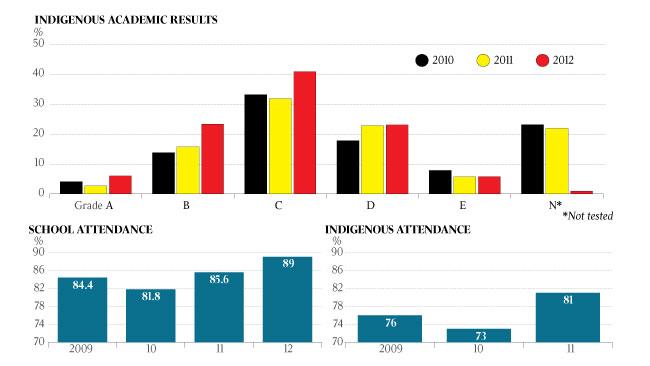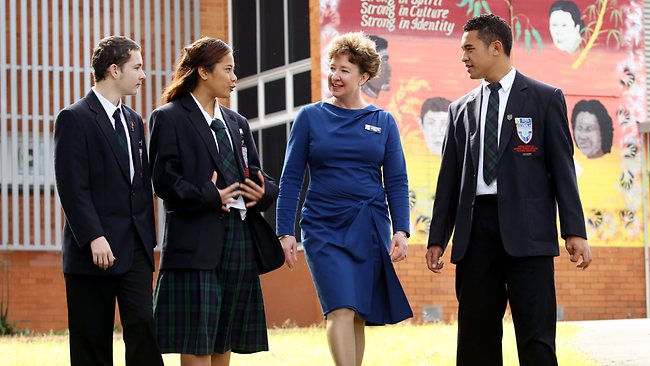Leadership brings dignity to the table at Glenala State High School
THREE years ago, the windows at Glenala State High School in Brisbane's southwest were boarded up.

THREE years ago, the windows at Glenala State High School in Brisbane's southwest were boarded up. They were broken as fast as the school could fix them; in the end, it was easier to replace the smashed glass with plywood.
Today, vandalism is a memory at Glenala. Since an extensive rebuild and refurbishment 18 months ago, the school, formerly known as Inala State High, has remained in pristine condition.
School captain Naomi Faatuai said the school had been run down and its students had lacked pride, but things had "changed for the better".
"Since the refurbishment and new buildings, it's increased the pride levels," Naomi said.
"There's no graffiti any more, not even in the toilets. The first graffiti ever appeared this year, not done by our students but by outsiders, and everyone wanted to see it. They thought it was disgusting. What a difference a couple of years can make."
Principal Corrine McMillan arrived at the school last year and is already turning around decades of falling enrolments, poor academic results and its entrenched rough-school reputation.
She said high expectations and high aspirations were the key, prompted by leadership, understanding and some simple but strictly enforced rules.
Some of the measures introduced by Ms McMillan were initially unpopular: forcing students to wear the correct uniform, especially leather school shoes; strict attendance; handing in assignments; and no mobile phones. Now students and parents credit them with changing the culture of the school.
"I'm an absolute stickler for getting the small stuff right," the principal said. "If you get the small stuff right, the big stuff follows.
"Communities want strong leadership; they always want a disciplined environment. It doesn't matter whether you're working in a high socio-economic school or a low socio-economic school; an indigenous or non-indigenous community; in the middle of Sydney or in Inala - all parents love their kids and want the best for them. That means strong leadership and a safe and supportive environment."
The school is in one of the city's poorest areas, in Inala, 20km southwest of the CBD.
Sitting in the federal seat of Oxley, once held by Bill Hayden and Pauline Hanson, Inala is mostly housing commission, has an unemployment rate of about 17 per cent, and many families who live below the poverty line.
It has a large indigenous community and a nearby immigration centre, which means Inala is the first stop for new migrants and refugees, primarily Vietnamese, Pacific Islanders and more recently refugees from Africa.
The school population reflects the make-up of the community, with 24 nationalities represented.
"Schools are complex places, and it's very easy to be distracted from the agenda," Ms McMillan said.
"Sometimes schools in low socio-economic areas get caught up in other issues. You're managing a range of issues, layer upon layer, of alcohol and drugs, single parenthood, poverty.
"A leader who gets caught up in that then reinforces the status quo. You end up as a welfare worker rather than an educator, and you facilitate that welfare environment."
The Pacific Islander families are large and the elder children are often expected to help out with their younger siblings, but Ms McMillan is adamant that her students arrive at school on time, and hand in assignments, accepting no excuses. She makes it clear to parents that their child's priority is school.
"Schools aren't drop-in centres, they're places of learning," she said. "We're not babysitting, and I absolutely refuse to do that. We're here for kids to learn, and as a community we recognise absolutely the power of education to change people's lives."
Since Ms McMillan took over as principal at the beginning of last year, enrolments have risen 13 per cent, with a 20 per cent boost in Year 8, the first year of high school in Queensland. Attendance at the school is up 12 per cent to more than 90 per cent of students, and attendance by indigenous students has improved from 75 per cent to more than 80 per cent.
Academic results are also improving, with the number of students achieving a Year 12 score high enough to attend university rising 13 per cent last year to more than 70 per cent of the class of 2011.
While only half of the parents thought their child was receiving a good education at the school in 2009, last year 87 per cent thought the school provided a good education.
Ms McMillan said strong leadership and a focus on relationships, with the students and the community, were crucial.
"While I'm firm with the students, they know I have a huge heart," she said. "I talk a lot about my high expectations and firmness but it's because I believe in them.
"It's about them. I tell them it's not about me, I already have a good job, it's about them."
yourschool@theaustralian.com.au


